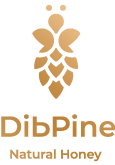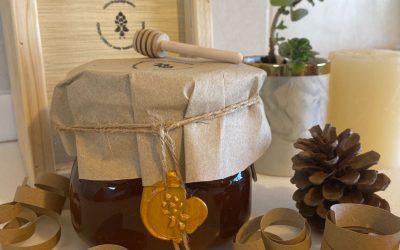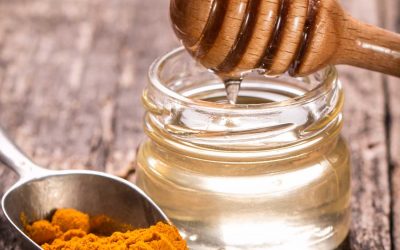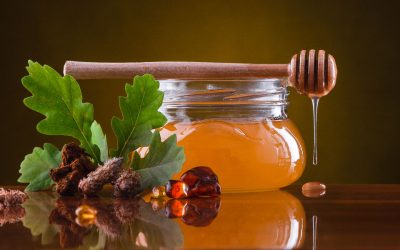What is organic honey? What is raw honey? What’s the difference between them? These are frequent, yet justified questions. I asked them myself and here is what I have found about organic honey and why it is that expensive.
There is set of standards and conditions that must be fulfilled in order to certify honey as “organic”. They consider:
– honey bees foraging area
The hives should be placed near clean water, on an area of 4 miles radius of natural organic crops (maximum distance bees travel from their hives), synthetic chemical-free vegetation, away from polluted areas like industrial zones, cities etc.
– bee management:
• all medical treatments necessary to combat the bees parasites must be made of natural products that leave no chemical residues in honey.
• during winter, the bees should eat honey, but if too much honey was taken, then they should be fed only organic supplements (honey, sugar, fruit concentrate etc).
– honey management
• Hives must be made of natural materials and if painted, using non-toxic paint, kept free of mites, spiders, mice and other pests.
• The entire process of extracting the honey, processing temperature, packaging materials, storage and transportation should follow the standard rules and be made using natural organic materials.
• Analyses must be made to prove that there are no chemical residues (synthetic pesticides or other materials such as cleaning products or repellents, antibiotics or synthetic medicine etc. A single gram of antibiotics can contaminate 100 tons of honey!)
• No additives should be added to the original honey. E.g.: sugar, corn syrup, sweeteners, non-compliant honey etc.
All these standards were first stated by EU and then by many other countries. In United States, there are no specific standards for organic honey, and thus the labeling is done following the standards for organic farming. These are helpful but don’t guarantee anything about honey. They say it is impossible to give explicit organic guidelines, because it is impossible to test ALL honey for residue. Moreover, hives can be placed in the middle of a field that covers 3 miles of natural, organic flowers, but can anybody know for sure, that one day, there wasn’t a wind that took pests from proximity and spread it on the natural field? Can anybody tell for sure that the bees, in their search for good pollen, didn’t cross the border of those 3 miles and collected pollen from some flowers that were sprayed with harmful chemicals or from industrial sources?
Nevertheless in other countries the testing do show the specific chemicals and their residue levels. And it seems that harmful pesticides are seldom found, somehow the bees don’t bring contaminated nectar into the hive. In fact, bees die because of pesticides, as we all know it happened in US in the latest years. This is the reason many countries have outlawed many of these pesticides. They were proved to be toxic and have disastrous effects on bees.
In US, the USDA 100% organic seal is not a guarantee for organic honey. There are few federal standards for honey, but no government certification and no consequences for making false claims. (Instead there are other alternative certification programs, as shown below.)
From the USDA Rules and Regulation:
“…honey does not require official inspection in order to carry official USDA grade marks and since there are no existing programs that require the official inspection and certification of honey,…”
The USDA procedures say that a honey producer can label his honey as organic without a certification process if he sells less that $5,000 per year and follows the USDA organic guidelines and government standards. This is done to support and encourage small beekeepers.
So, if you want to buy honey from a local producer, it’s better to ask about the process and techniques used and check their websites. Subsequently you can tell if the honey was organic, from your personal tests, and decide if you enjoyed and benefited from it. Then buy again from that producer.
For many small bee farmers, the process of getting certification from government is time-consuming and expensive. Yet, there are alternative certification programs for the smaller organic beekeeper who wants to preserve high organic standards and remove financial barriers.
Quality Assurance International offers good guidelines for organic farming and participating in the alternative certification program. Here is Organic honey standards and some very interesting Q&A.
Examples of standards and conditions in different countries:
In United States, from the standards for organic farming:
– USDA Organic Labeling and Marketing Information
– USDA Organic Certification: Required by farms wishing to label food, “Organic”
– USDA Organic Production and Handling Standards
In European Union: COMMISSION REGULATION (EC) No 889/2008
In Canada: Organic_Production_Systems_General_Principles_Canada; Organic_Agriculture_032_0310_1999-e_Canada
In United Kingdom: Compendium_of_UK_Organic_Standards
In Germany: COUNCIL REGULATION (EEC) No 2092/91
In Australia: NATIONAL STANDARD FOR ORGANIC AND BIO-DYNAMIC PRODUCE
For organic honey there are other Alternative Certification Programs like:
Certified Naturally Grown Apiary Certification Standards (In USA)
WFA Honey Producer’s Pledge (in UK)
references:
http://www.bioapis.pt/index.php/en/organic-honey



